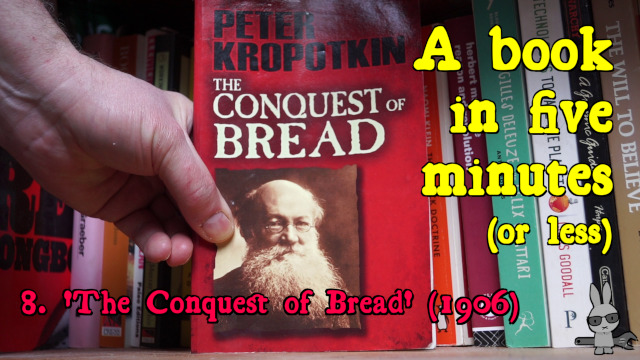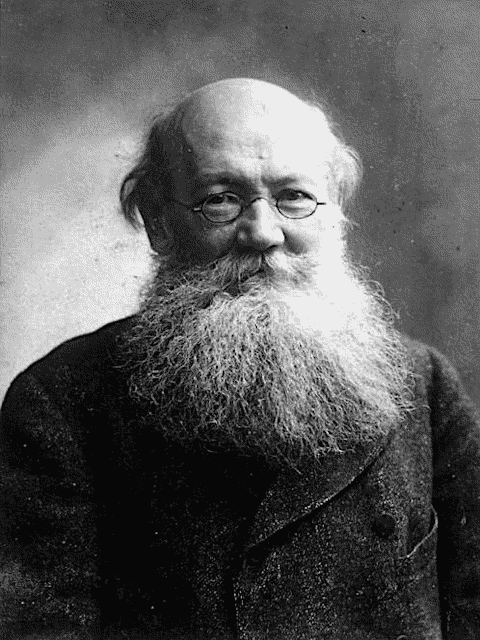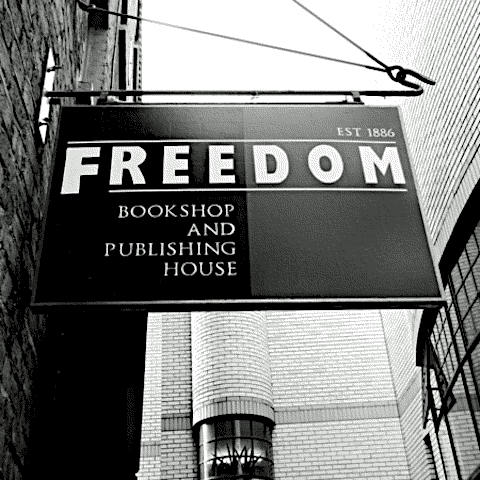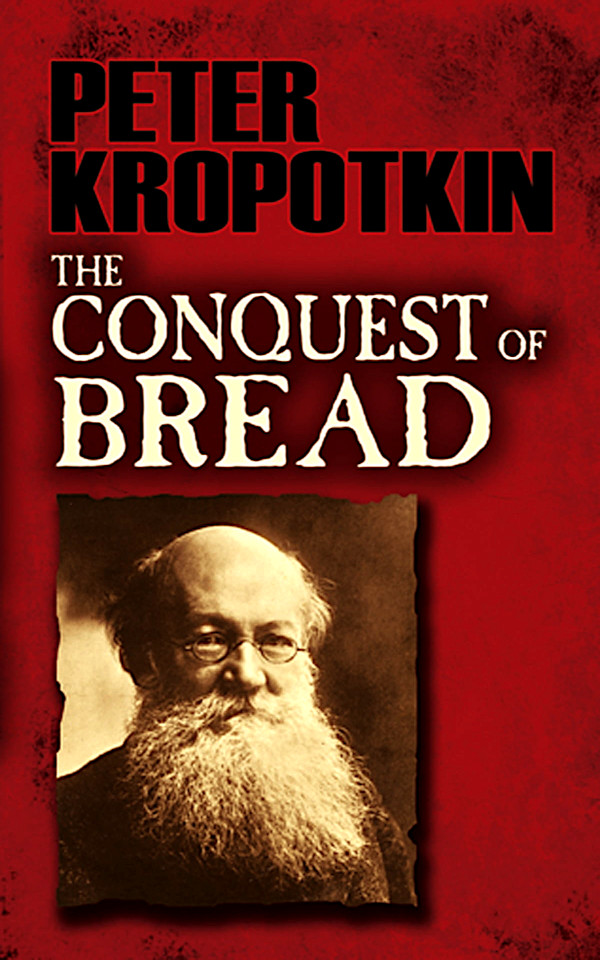
‘The Conquest of Bread’ (1906)
Peter Kropotkin’s book doesn’t just challenge the power elite. At its core it challenges the general approach of ‘the left’, and the left’s infatuation with lofty ideals rather than the basic needs and conditions of the people.
 © 2022 Paul Mobbs; released under the Creative Commons license.
© 2022 Paul Mobbs; released under the Creative Commons license.
Created: Monday 28th February 2022.
Length: ~1,150 words.
Click for hotkeys list (or press hotkey-K).
‘A Book in Five Minutes’ No.8 Podcast:
Download podcast as an MP3 or an Ogg Vorbis file.
Click for keyboard instructions (or press hotkey ‘X’)
“Great ideas sprang up at such times, ideas that have moved the world. Words were spoken which still move our hearts… But the people were still starving in the slums.”
Setting down ideas or facts in the black and white of printed text gives them a disruptive power. That’s why books have the power to inspire change; and that’s why people burn them.

9th December 1842 – 8th February 1921.
‘The Conquest of Bread’:
‘The Conquest of Bread’, Dover Press unabridged edition (shown in the video), 2011. ISBN 9780-4864-7850-0.
‘The Conquest of Bread’, AK Press' Working Classics edition (support your anarchist publishers!). ISBN 9781-9048-5910-9.
‘The Conquest of Bread’, Anarchist Library free on-line edition.
I first read Kropotkin’s, ‘The Conquest of Bread’, in my teens. Active in a number of groups, the book echoed my experience of how people often argue over abstract ideals rather than making physical change. And raising that fact often brought a very negative response.
That reaction was as instructive as the book itself, and seemed to chime with the ideas I was reading from the text:
“Whether the leaders belonged to the middle or the working classes, it was always middle class ideas which prevailed. They discussed various political questions at length, but forgot to discuss the question of bread.”
Published in 1906, ‘The Conquest of Bread’ represents the high point in a half a century of developing anarchist thought; soon to end in the chaos of World War, the Russian Revolution, and the First ‘Red Scare’. The book is a surgical critique of various schools of socialism, and their focus on controlling the apparatus of the state: Political projects which sought revolution, so long as it preserved – from the mines, to factories, to consumer goods – the structures of industrial society.
What these movements overlooked was the importance of people having the capacity to feed themselves. Not simply that there is enough food; or that food might be doled-out by an all-powerful state; but that people had the security to supply their own needs, locally, from their own creative power as a community, and thereby preserve their basic freedoms.

“The day when the labourer may till the ground without paying away half of what he produces, the day when the machines necessary to prepare the soil for rich harvests are at the disposal of the cultivators, the day when the worker in the factory produces for the community and not the monopolist – that day will see the workers clothed and fed, and there will be no more exploiters.”
Be it Karl Marx or Adam Smith, the basis of economic thought is dominated by production and growth. Kropotkin wanted to turn that on its head: To focus on meeting basic needs, not abstract material production; and to do that from the bottom-up, not the top-down.
The insurrections of the Eighteenth and Nineteenth Centuries had often created famine as systems of food production or supply were disrupted. This made the Revolution easy to defeat, as most people will prefer bad governance to starvation. What Kropotkin saw as the gravest error of socialism was its need to preserve both the top-down management of the means of production, and as part of that, the system of wages necessary to differentiate the skill-level of people working in that system. This does not create a true people’s state, but rather the rule of a technocratic elite, bent on maintaining the structures that create their technocratic hierarchy:
“The people suffer. With child-like faith… they think that ‘yonder’, in the House, in the Town Hall, in the Committee of Public Safety, their welfare is being considered. But ‘yonder’, they are discussing everything under the sun except the welfare of the people.”

If Marxist-Leninists have a traditional hatred of anarchists, then it is precisely because anarchists did not wish the people to cede control to the state. Replacing one elite with another ends in the ‘state capitalism’ of the Soviets, or the modern Chinese Communist Party, and their resultant domination of people’s lives. And as we look at modern capitalism, with its developing “you will own nothing and you will be happy” ethos, it too is becoming a technologically-enabled Panopticon – far closer in form to the Chinese state, rather than the principles of democratic expression and communication that it claims to represent.
“It seems to us that there is only one answer to this question: We must recognise, and loudly proclaim, that every one, whatever his grade in the old society, whether strong or weak, capable or incapable, has, before everything, THE RIGHT TO LIVE; and that society is bound to share amongst all, without exception, the means of existence at its disposal. We must acknowledge this, and proclaim it aloud, and act-up to it.”
The wealth and power of elites have their basis in expropriation – in making a mass of people poor so that an elite might live in luxury. Replacing a ‘class elite’ with a ‘technocratic’ one, however allegedly representative, does not end that process. Only a bottom-up, locally organised, and federated system serving people’s basic needs can end exploitation.

Coming from a poor family, where we grew and foraged food as an important part of our economic well-being, I found Kropotkin’s words inspiring. They made sense to me – certainly far more sense than the economic dogma of either Marx or Hayek:
“Bread. It is bread that the Revolution needs! Let others spend their time issuing pompous proclamations… and in talking about political liberty. Be it ours to see, from the first day of the Revolution to the last... that there is not a single man who lacks bread, not a single woman compelled to stand with the weariful crowd outside the bake-house door that a coarse loaf may be thrown to her in charity, not a single child pining for want of food.”
In Britain, where there are twice as many food banks as McDonalds stores, planning a revolution based upon the notion of meeting the basic need for food, not material wants, is truly revolutionary. But as we enter a long and unpredictable slide into ecological crisis, Kropotkin’s words have far greater relevance today than when they were first written over a century ago.